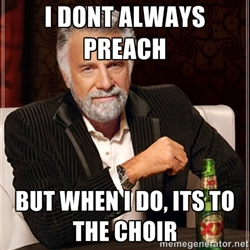- Always read the article before posting it. NEVER trust the headline. There is nothing worse than posting an article because you completely agree with the headline only to open it up and discover that you completely disagree with what the actual article says. For that matter, make sure the article is from a credible source and not Jim Bob’s Website of Conspiracy Theories.
- Blanket statements will come back to bite you in the ass. It might not be immediately, but eventually you’re going to get bit.
- There will be people, both right-wing and left-wing, who are operating on nothing but the propaganda of their party. The second that you start giving facts and sources and asking them to do the same they will resort to calling you names and shouting invectives against your character. If this happens on their page, walk away. If it happens on your page, politely ask them to be respectful and to source what they’re saying. Eventually, in my experience rather quickly, they will run out of ways to avoid stating facts and block you. Then you don’t have to deal with them anymore, and then you have a fun story about that one time you were called a fascist on the internet.
- The odds of completely changing somebody’s mind is low. However, the odds of getting somebody to think about something in a new way, or to question the way they do think about something is fairly good. Set your expectations accordingly. People who are undecided about issues are the most fun to talk to.
- If someone’s fundamental beliefs are the polar opposite from yours, put the mouse down and step away from the computer. Even in the best of circumstances – face to face with charts, graphs, and expert Witnesses at your beck and call – the odds are slim to none that you will sway that person to your way of thinking, or that they will be able to sway you to theirs. The odds of it happening on the internet are non-existent. Save everybody a headache and don’t even try.
- It is perfectly acceptable to agree to disagree. And just because you disagree does not mean that you cannot still be friends. Always try to take the high road, and if you truly have offended someone, apologize.
- ‘I’ statements help to further the conversation, while ‘you’ statements generally result in someone taking offense. For example ‘I disagree because of XY and Z,’ vs ‘You are wrong. The answer is XY and Z.’
- Know your facts, and be prepared to admit when you have entered areas where your knowledge is lacking.
- Sometimes you just need to preach to the choir and ignore the haters. That’s okay too.



